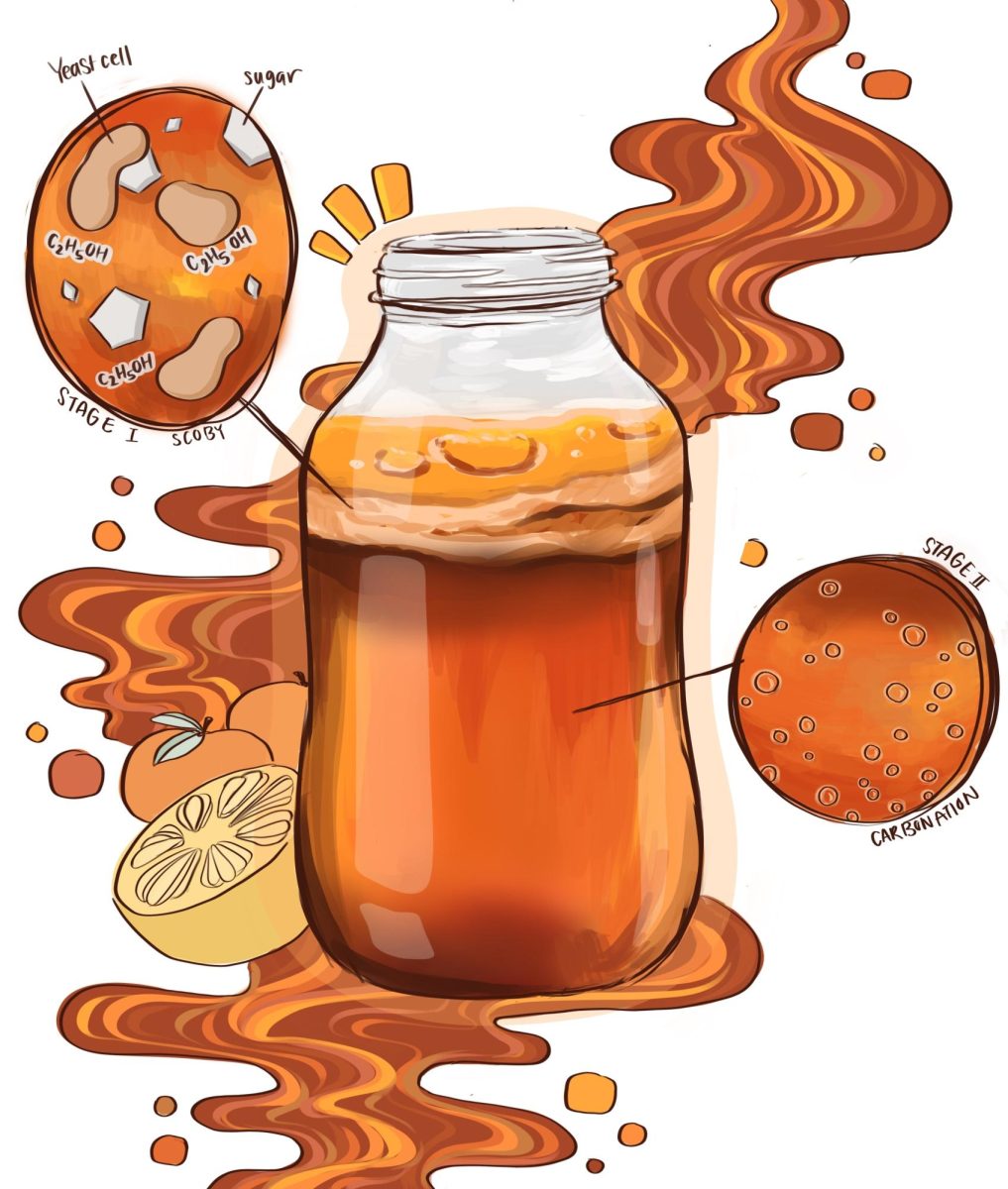While kombucha has been around for thousands of years — originating in China and spreading across the world — its rise in popularity in the past decade aligns with a broader health movement toward mindful eating and gut health.
Kombucha is a fizzy and tangy fermented tea drink made from just a few simple ingredients: tea, water, sugar and a symbiotic culture of bacteria and yeast. The fermentation process, which takes around two weeks, gives kombucha its characteristic tartness and natural carbonation, making it a popular alternative to sugary soft drinks.
While store shelves are now lined with commercial varieties that come in many different flavors from brands like Synergy, Health-Ade and Brew, math teacher Walter Han uses a kombucha starter kit to brew his kombucha from scratch.
“I personally like to do some kind of berry mixture or ginger lemon, something very simple, and it tastes really good,” Han said. “What I like about it is that it’s pretty low on sugar, ironically. It’s counterintuitive because the yeast bacteria eat all the sugar.”
During the first stage of fermentation, which takes 10 to 14 days, yeast converts sugars into ethanol, which bacteria subsequently oxidizes into acetic acid, contributing to kombucha’s distinctive tartness and low sugar content. In the second stage of fermentation, the kombucha is stored in a glass bottle, and the pressure from the rigid sides of the container produces carbonation. Brewers then add any sweeteners or fruits to enhance the taste.
Lab studies have found that kombucha contains various bioactive compounds, which contribute to its antioxidant properties. Additionally, kombucha is considered a probiotic beverage due to the presence of live microorganisms that may confer health benefits by supporting gut health.
While lab-based studies have proven these properties of kombucha, trials on humans are limited, and more research is needed to verify these claims.
Junior Kimi Yashar, who drinks kombucha on a regular basis, believes kombucha’s health benefits are likely but acknowledges the science is still inconclusive.
“I’ve learned about fermenting bacteria in biology, how it’s used to make soy sauce and other foods,” Kimi said. “Kombucha is supposed to be good for your digestive health, and it’s definitely possible, but I haven’t tracked any effects myself.”
Executive Director of Strategic Initiatives Joe Rosenthal was drawn to kombucha as a part of a broader shift towards healthier living, inspired by his wife’s interests into nutrition, which began after they listened to an audiobook called “Good Energy” by physician Casey Means. While he acknowledges improvements in his overall health, he attributes those changes mostly to dietary restrictions such as no sugar, no processed foods and no preservatives, rather than specifically drinking kombucha.
“To take care of your cells, the sugar that you digest must get to your cells and burn it as energy, but when your cells don’t work well, that’s the cause of all disease,“ Rosenthal said. “So we started this comprehensive approach of both diets and probiotics with kimchi, Greek yogurt and kombucha.”
Even without definitive proof of its health benefits, kombucha’s popularity continues to grow. Rosenthal attributes this growing interest to increased awareness of nutrition’s role in overall well-being.
“There’s been a lot more focus on health in recent years,” Rosenthal said. “I’m not sure exactly why, but I have a good feeling it’s because when you really look at American health, it’s not very good. It’s devastatingly poor.”


















![“[Building nerf blasters] became this outlet of creativity for me that hasn't been matched by anything else. The process [of] making a build complete to your desire is such a painstakingly difficult process, but I've had to learn from [the skills needed from] soldering to proper painting. There's so many different options for everything, if you think about it, it exists. The best part is [that] if it doesn't exist, you can build it yourself," Ishaan Parate said.](https://harkeraquila.com/wp-content/uploads/2022/08/DSC_8149-900x604.jpg)




![“When I came into high school, I was ready to be a follower. But DECA was a game changer for me. It helped me overcome my fear of public speaking, and it's played such a major role in who I've become today. To be able to successfully lead a chapter of 150 students, an officer team and be one of the upperclassmen I once really admired is something I'm [really] proud of,” Anvitha Tummala ('21) said.](https://harkeraquila.com/wp-content/uploads/2021/07/Screen-Shot-2021-07-25-at-9.50.05-AM-900x594.png)







![“I think getting up in the morning and having a sense of purpose [is exciting]. I think without a certain amount of drive, life is kind of obsolete and mundane, and I think having that every single day is what makes each day unique and kind of makes life exciting,” Neymika Jain (12) said.](https://harkeraquila.com/wp-content/uploads/2017/06/Screen-Shot-2017-06-03-at-4.54.16-PM.png)








![“My slogan is ‘slow feet, don’t eat, and I’m hungry.’ You need to run fast to get where you are–you aren't going to get those championships if you aren't fast,” Angel Cervantes (12) said. “I want to do well in school on my tests and in track and win championships for my team. I live by that, [and] I can do that anywhere: in the classroom or on the field.”](https://harkeraquila.com/wp-content/uploads/2018/06/DSC5146-900x601.jpg)
![“[Volleyball has] taught me how to fall correctly, and another thing it taught is that you don’t have to be the best at something to be good at it. If you just hit the ball in a smart way, then it still scores points and you’re good at it. You could be a background player and still make a much bigger impact on the team than you would think,” Anya Gert (’20) said.](https://harkeraquila.com/wp-content/uploads/2020/06/AnnaGert_JinTuan_HoHPhotoEdited-600x900.jpeg)

![“I'm not nearly there yet, but [my confidence has] definitely been getting better since I was pretty shy and timid coming into Harker my freshman year. I know that there's a lot of people that are really confident in what they do, and I really admire them. Everyone's so driven and that has really pushed me to kind of try to find my own place in high school and be more confident,” Alyssa Huang (’20) said.](https://harkeraquila.com/wp-content/uploads/2020/06/AlyssaHuang_EmilyChen_HoHPhoto-900x749.jpeg)












